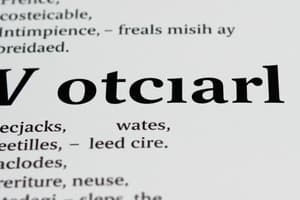Podcast
Questions and Answers
Match the following prefixes with their meanings:
Match the following prefixes with their meanings:
Un- = Negations or opposites Pre- = Relating to before Re- = Repetition or reversal Dis- = Negations or opposites
Match the following prefixes with their meanings:
Match the following prefixes with their meanings:
In- = Negations or opposites Ant- = Against De- = Repetition or reversal Pro- = In favor of something
Match the following prefixes with their meanings:
Match the following prefixes with their meanings:
Non- = Negations or opposites Be- = Repetition or reversal Dis- = Negations or opposites Pro- = Before
Match the following suffixes with their functions:
Match the following suffixes with their functions:
Match the following suffixes with their functions:
Match the following suffixes with their functions:
Match the following prefixes with their meanings:
Match the following prefixes with their meanings:
Match the following suffixes with their functions:
Match the following suffixes with their functions:
Match the following prefixes/suffixes with examples:
Match the following prefixes/suffixes with examples:
Match the following prefixes/suffixes with their usage:
Match the following prefixes/suffixes with their usage:
Match the following suffixes with examples:
Match the following suffixes with examples:
Flashcards are hidden until you start studying
Study Notes
Prefixes and Suffixes
Prefixes and suffixes are essential components of words in many languages, including English, and they play crucial roles in altering the meaning, context, and grammatical function of words within phrases and sentences. In this guide, we will explore some common prefixes and suffixes and how they impact the understanding of words.
Common Prefixes
Prefixes are usually attached to the beginning of a word to indicate a meaning different from the base word. Here are a few common prefixes and their meanings:
-
Un-, Dis-, In-, Non-: These prefixes indicate negations or opposites. For example, "unhappy" means lacking happiness, "dislike" indicates disapproval, "incomplete" signifies missing parts, and "nonviolent" suggests a lack of violence.
-
Pre-, Ant-, Pro-: These prefixes relate to before, against, or in favor of something. For example, "preheat" means before heating, "antiwar" indicates opposition to war, and "protestant" signifies belief in a particular faith or denomination.
-
Re-, De-, Be-: These prefixes often indicate repetition or reversal. For example, "recycle" involves doing again, "dedicate" signifies thorough devotion, and "beauty" is an intrinsic quality.
Common Suffixes
Suffixes are usually attached to the end of a word to alter its meaning, form, or grammatical function. Here are some common suffixes and their meanings:
-
-er, -or: These suffixes typically make nouns into verbs or vice versa. For example, "writer" becomes "write", and "door" becomes "doore".
-
-ly: This suffix indicates how or manner; for instance, "quickly" shows speed and "kindly" shows kindness.
-
-ed, -d: These suffixes often create past tense forms of regular verbs, such as "walked" from "walk" and "kicked" from "kick".
-
-able, -ible: These suffixes imply capability or capacity; examples include "flexible" and "stable".
Understanding Prefixes and Suffixes
To correctly interpret words containing prefixes and suffixes, you must understand what each bit of syntax conveys. Always look at the whole word, not just the base word, to grasp the intended meaning. Remember, context matters too: if you see "dislike" in one sentence but "incomplete" in another, your understanding will be different due to the distinct meanings conveyed by each term.
In sum, prefixes and suffixes are fundamental building blocks of language that help us express complex ideas. They allow us to communicate precisely, ensuring our messages are understood accurately.
Studying That Suits You
Use AI to generate personalized quizzes and flashcards to suit your learning preferences.





